The Fate of Lee Khan (1973)
Directed by: King Hu
Written by: Chung Wang, King Hu
Starring: Feng Hsu, Li Hua Li, Roy Chiao, Ying Bai
AKA YING CHUN GE HI FENGBO, TROUBLE AT THE WELCOMING SPRING INN
Taiwan/ Hong Kong
AVAILABLE ON DUAL FORMAT BLU-RAY AND DVD: NOW, from EUREKA ENTERTAINMENT
RUNNING TIME: 105 mins
REVIEWED BY: Dr Lenera, Official HCF Critic
In the late 1300s, during the Yuan Dynasty established by the Mongolian leader Kublai Khan, The Chinese people, frustrated with political corruption and oppression, are revolting under the lead of Chu Yuan-Chang. Mongol general Lee Khan is in charge of investigating the rebellion’s spy activity, and he his sister Lee Wan’er travel to the Spring Inn in Shaanxi province to obtain a map of the tactical plans of the rebel Chu Yuan-Chang’s army. However, a group of undercover resistance fighters, aided by Madame Wan, innkeeper of the Spring Inn, seek to recover the map to save the rebellion.…
It’s been a while since Eureka Entertainment have brought out a King Hu film, and after enjoying Dragon Inn, A Touch Of Zen and Legend Of The Mountain I wanted to see another. For those readers not around when I reviewed the above three films, Hu revolutionised the formerly quite staid wuxia genre by combining Japanese samurai movie traditions with Western editing techniques and Chinese aesthetic philosophy. While he didn’t always have much success at the box office, he’s still regarded by many as one of the masters of this kind of film. His action scenes may seem a bit dated in choreography compared to the amazing stuff that we would see later, and don’t always display that much fighting skill, but Hu’s mastery of story telling [in no way are his films a series of fight scenes tenuously linked by a weak plot that you don’t care much about], and atmosphere, and the amount of care he put into his work, is still highly impressive and can cast quite a spell. The Fate Of Lee Kwan, his first film for Golden Harvest, may be the most sheerly enjoyable effort out of the four films that I’ve now seen. It’s far less ambitious, esoteric and inventive than A Touch Of Zen and Legend Of The Mountain, but works as a summation of Hu’s mastery of this kind of movie. It’s much closer to 1967’s Dragon Gate Inn which was similarly largely set in an inn where good and bad guys come and go [In fact I gather that Hu’s first wuxia effort Come Drink With Me, the film that made his name, also spent much of its time in an inn, obviously Hu likes inns] but the direction and indeed everything else are so much more assured, making that movie look a bit primitive by comparison.
Now, while I wholeheartedly suggest that, if you’re new to Hu, you start with this film, I should tell you right away that, despite dispensing with the philosophical or mystical elements [unless they were so inbedded that I failed to pick up on them], it’s not a fight fest, containing just a couple of brief scrapes until the final reel despite featuring Lady Whirlwind herself Angelo Mao in a role, but then this is a film that would also probably work fine if it didn’t have any fight scenes at all, as long of course you’re game for a very slow burning suspenser where you just hang out at the inn with the staff and the customers until the tension starts to be brought in, and even then the action is held off for as long as possible. I bet Quentin Tarantino is a fan, you can certainly see its influence on The Hateful Eight. But even Tarantino isn’t as good at blocking within a moving frame as Hu, The Fate Of Lee Khan almost functioning as a master class on how to do this. If you’re going to make a movie that contains a lot of dialogue-heavy scenes, you’re going to have to consider every shot carefully if you still want to maintain a pace that moves the story forward. Saying that, I was so enjoying spending time at the Spring Inn that I would have content even if the filming had been flat and static. A vibrant centre of the region as opposed to the desolate way station of Dragon Gate Inn, the Spring Inn is rather like Rick’s in Casablanca. The resistance rubs shoulders with the occupation, nobody is shocked to find gambling going on, and Feng Tien’s Lee Khan oozes arrogance, malevolence and cunning much like Conrad Veidt’s Major Strasser. He’s a bad guy you can’t help but at least admire, because he’s so intelligent and says some things that do actually make sense. But maybe I’m getting ahead of myself, because Khan does not actually make a entrance until about half way through – though boy does he get a good one when he does!
Some narration sets the scene with clarity as Khan’s sister Wan’er meets with a man ready to offer a valuable map, only for her to say to him, “he wants to deal with you directly”. Cut to an inn and an old man saying to another, “Lee Kahn will be here, notify Madame Wan”. The innkeeper of this place shouldn’t really be too happy that he’s lost a great deal of business due to the Spring Inn re-opening after seemingly being closed for a while, but then both innkeepers are members of the resistance. One of the reason for the Spring Inn’s popularity seems to be that Madame Wan has recently hired four pretty young ladies as waitresses, cue for some lewd bothering from some of the customers, particularly a certain Mr. Hu [played by Wei Ping Hun, the gay hoodlum in The Way Of The Dragon], who seems to be trying to be as annoying as possible, sending food back for both having no salt and for having too much salt, and grabbing the women. He also appears to be drinking a hell of a lot and occasionally having quick dialogue exchanges with another guy that he hopes aren’t being seen. It seems that he could be playing a role. Also drinking a lot is a guy who likes to sing “humorous” songs about the inn and others. And I really liked the “country bumpkins” who stumble on the gambling room and immediately do really well. Folk enter the place and we have to try and work out if they’re for the resistance, against it, or have nothing to do with all this political stuff altogether. There are some red herrings, initially drawing our attention, only to be later revealed as a minor part in the machinations of the spy game, and character development seems to be based on how deceptive you’re being, but it’s all a lot of fun anyway, even if you may lose track at times. There’s a great moment when three soldiers burst in and demand everyone’s money only for our four waitresses to burst into action, leaping around and quickly defeating them, after which one patron happily says to another, “how exciting, a fight in the middle of a nice meal”. But for the most part the tone is quite light for quite a while even though we’re engrossed in all the mysterious goings-ons. It’s rather like watching a play, and in a good way.
The gradual evolving into seriousness is masterly done. First we get a magistrate who turns up, then some more soldiers who want wine delivered to their companions some distance away outside, then Khan himself enters and orders that, “only those who work here need remain”, after which his closest aide Tsao Yu-kun notices that, “the people working here are not locals”. By now Khan has the map but the rebels want it back, leading to more complications which a lesser director would have let slip into farce, but now there’s nothing funny about what’s going on, and Hu keeps pushing the suspense – he knows that we want to see it all explode into big fight set pieces but he teases and teases us, probably really trying the patience of some viewers in the process. Several times you think that things are going to kick off, only to be let down. But of course eventually they do, usually with weapons but sometimes without, and with the six female characters at the forefront. Of course there had been female-led films of this type previously, but it was this one that really kicked off this trend in the East [not so much in the West though]. The women in this film made such an impression on me that it overshadowed my appreciation of things like, me being a tremendous lover of Bruce Lee and his movies, seeing The Big Boss‘s bad guy Han Ying-chieh as a particularly heroic good guy, and his fighting skill seems to have improved since 1971 [or maybe Bruce didn’t want him to look too good] too. And we don’t get a romance between anyone either.
The action is decent, but not necessarily the best aspect of the film. As usual for Hu, he’s not that interested in showing off martial arts techniques, and it’s rather amusing seeing Roy Chiao wave his arms about, but there’s a bit more skill and indeed speed than normal because no less than Sammo Hung choreographed the fights on display here, and despite this being an early job for him you can see the difference. While this is still a film where someone is able to kick a sword into somebody so it impales him, and there’s an attempt [which doesn’t really work] to create the illusion of flying with quick cuts, the fantastical is minimised. There seems to be little actual wire-work. Not that many of the trampoline jumps and somersaults seem to be done by the main performers though. At one point Mao seems to do a somersault over the bar but it’s really a wipe. The stunt person dressed as her passes behind the wall, stops, and Angela steps out – and without a hair out of place. She only has one fight too which was something of a let down for this fan, but then she seems to have been hired more for her acting skills here, and they’re really not bad, Mao nicely revealing a vulnerability as the waitress formerly known as pickpocket Black Peony. A particularly memorable moment is when she steals a pearl and is then ordered to put it back, a nice melding of comedy and tension. Familiar Hu cast member [among a few others] Hsu Feng is even better as Khan’s really rather unsettling sister Wan’er, sketching a vivid portrait of evil with little dialogue. Her screen presence is always strong, but it’s especially powerful here. In one very memorable scene, her and Kahn are not so much entranced by a song as they are in ecstasy over it. It humanises these villains in an odd but effective way.
Tsing-Can Chun’s cinematography makes terrific use of the Scope format [just check out the way so many characters are often crammed into one shot without it feeling cluttered], and there’s even some deep focus, notably when one character is in the foreground on the left and we can see another getting tortured in the background through an open door in the background. As you’ve probably gathered if you’ve been reading me for long enough, I’m big into Asian martial arts movies, but I’ll be the first to admit that you rarely get this kind of artistry in other Chinese efforts of the time. On the other hand the music score is credited to the very prolific Joseph Koo but it’s not always well applied, and doesn’t actually sound like him at all so I wonder if the music is the usual mixture of previously used tracks. I noticed one dramatic cue employed several times that later turned up in the ‘so bad it’s good’ Italian zombie shocker Burial Ground. It sounds different from the rest of the score, so Koo probably re-used it from something else. But it’s nice that, during most of the fighting, footsteps, grunts and the clang of steel on steel take over. Overall, The Fate Of Lee Khan is a really well balanced and approachable piece of entertainment that juggles intrigue, face-offs and amusement expertly, and which should be enjoyed by many, even those not into period martial arts movies. Despite the undeniable greatness of A Touch Of Zen, I reckon that this will be the Hu film that I will return to most often in the future.
Rating: 









The Fate Of Lee Khan previously came out on Region ‘A’ from Film Movement. This release probably uses the same print but, apart from just one quick white blemish and a few ‘in motion’ shots that have blurry edges, I can’t complain at all. It’s all very bright, but this suits the film. Grain is well managed. Now the North American release only had Mandarin and English 5.1. This one adds Mandarin Mono and English Mono, though it doesn’t contain English 5.1 as stated. Now, while I’ve stated that I prefer to view films like this in their English dubs, Hu’s films are an exception because the dubs seem to be done by a different dubbing house. The subtitles on the Mandarin versions reveal that the English dub is close to the script, but it’s very uneven because the dubbers of the main characters seem to be taking it seriously but the supporting ones don’t. I soon switched over to the Mandarin Mono which was fine. Occasional further switches to the Mandarin 5.1 track revealed something odd. During action scenes, some new sound effects seem to be added which are considerably louder than the original effects which are sometimes much quieter. Strange. Maybe not all the original audio material was available and/or in poor quality for the remix.
Film Movement added one interview, Eureka have replaced it with another and added an audio commentary. Tony Rayns supplies the latter in his usual laid back, slightly rambling fashion. It’s obvious that very little information on the making of this film exists and Rayns has to try to make up for this with a very extensive biography of Hu, while also skipping major sections of the film [the Blu-ray jumps forward in its own if you listen to the commentary]. But I learnt a lot that was of interest which is the main thing, like when Shaw Brothers decided to punish Hu for leaving them by trying to stop Dragon Gate Inn getting into Hong Kong cinemas and replacing it with a sequel to – Hu’s Golden Swallow. Rayns is also very good on the changing shooting style, noting the influence of Lee on the style of action, and why Hu’s work is so distinctive and critically admired. The video essay is officially listed as being by David Cairns, but I’ve taken the liberty of altering the ‘special features’ list because Anne Billson, who after first seeing it “treasured memories of it for decades”, contributes just as much as Cairns. She goes through the story analysing things as she goes, while he looks at more general issues concerning the film. There’s surprisingly little overlapping with the commentary in this to the point, easy to assimilate, piece.
Out of the ones that I’ve seen, The Fate Of Lee Khan is King Hu’s most fun picture while still full of his trademark artistry. Highly Recommended.
SPECIAL FEATURES
*Includes O-Card slipcase
*1080p transfer of the film on Blu-ray, with a progressive encode on the DVD
*Optional English subtitles
*Original Mandarin audio, available in original mono (uncompressed on Blu-ray) and restored 5.1.
*Optional English audio, available in original mono
*Brand new and exclusive commentary by critic and Asian cinema expert Tony Rayns
*A brand new and exclusive video essay by David Cairns and Anne Billson
*Original Trailer
*A collector’s booklet featuring new and archival writing on the film

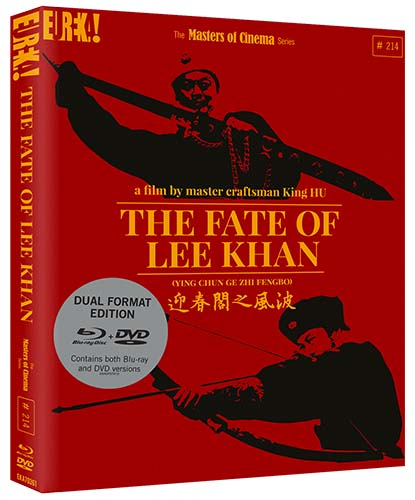
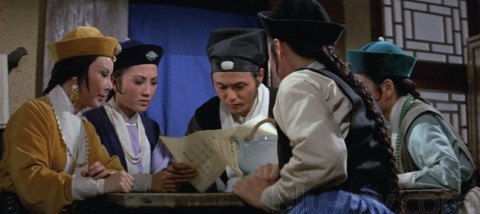
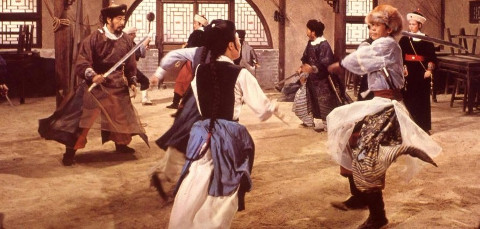

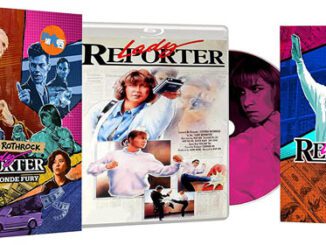
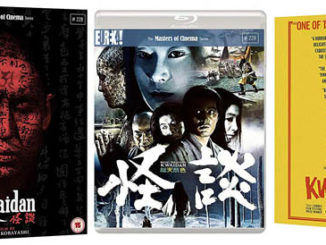
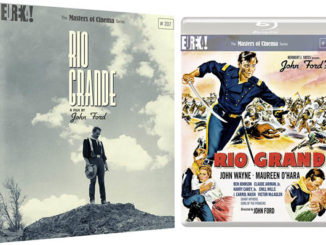
Be the first to comment